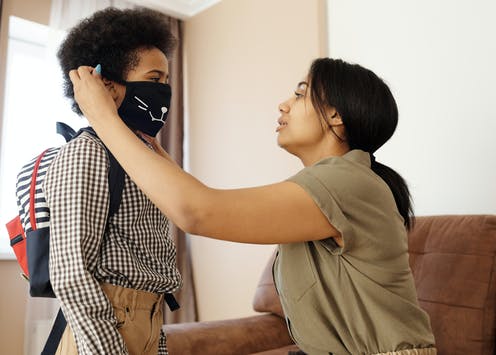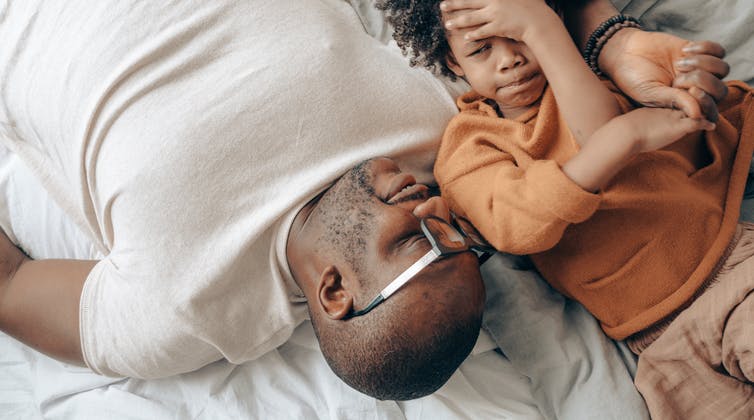
Going back-to-school is an exciting time for many children. But for some it also stirs up stress and anxiety. Are they going to like their new teacher? Are they going to enjoy their new school? Are their friends going to be in their class?
It is normal for young children to experience anxiety when separating from parents or caregivers. When you layer a pandemic on top of ordinary back-to-school stress, many children will be struggling more than usual.
In everyday language, it’s common for people to talk about children (or even pets) experiencing separation anxiety.
When children experience more intense fears and anxieties that interfere with going to school over a prolonged period of time, or that interfere with how they function at school and/or how they interact with others, this is what psychologists call separation anxiety disorder. Separation anxiety disorder is the most common anxiety disorder in children under 12 years of age.
Even when children are experiencing typical levels of anxiety — whether they are starting kindergarten, transitioning to a new school — or returning to more familiar surroundings, how parents respond is important.

THE CANADIAN PRESS/Paul Chiasson
Table of Contents
Anxiety and the pandemic
After long periods of social isolation with family members, it may be hard for some children — and parents — to be separated from them once the school bell rings.
Particularly after our pandemic year, some children and parents may still feel some anxiety about going into unfamiliar places. They may also have concerns about pandemic safety that makes going back to school stressful.
In a normal year, approximately one in 10 children experience elevated anxiety levels. However, research shows that anxiety levels in children have doubled during the pandemic, with one in five experiencing significant anxiety.
In the past year and a half, most children spent more time at home than usual, notably when schools were closed. Even when children were allowed to spend time with friends, there were often restrictions in place, such as being outdoors or keeping a mask on, and staying socially distant.
For some children, these restrictions can increase stress associated with interactions outside of their family.
What separation anxiety can look like
Separation anxiety can unfold in different ways. Children may refuse to go to school or participate in new activities in the absence of their parent. They may also refuse to go to bed without their parent or sleep away from home.
Some children experiencing separation anxiety have physical symptoms such as stomach aches and nightmares, while others may experience headaches or a racing heartbeat. Others may have persistent thoughts that something bad is going to happen to themselves or to their parents.
Read more:
How to help your child cope with the transition back to school during COVID-19
Some children may also be anxious when it comes to the pandemic specifically.
Going back to school can entail some risks for unvaccinated children, and some may fear contracting COVID-19 or transmitting it to their friends and family. Also, children, much like adults, may feel a little “rusty” when it comes to interacting with people outside the family, particularly with strangers like a new teacher.

(Pexels/Ketut Subiyanto)
Strategies to support your child
Whether you know your child has struggled significantly with anxiety before, or they seem worried or anxious about going back to school, we offer several strategies below to help you navigate these feelings with them.
-
Validate your child’s fears and anxieties. Feeling anxious about separating from the comfort of caregivers is a normal response to stressful events. When children express anxiety, let them know you hear them and understand. You can validate and normalize their feelings by saying: “I get that you feel worried. I bet many other kids are feeling that way too.”
-
Encourage positive self-talk. Help children develop a growth mindset that includes positive and productive statements such as: “I am brave, I can do this.” Positive self-talk has been linked to increased self-esteem in kids. Try practising this at home in the lead up to school, so it’s familiar and easy for kids to use these statements when they are separated from you or get anxious at school.
-
Plan to take small steps through the fall. It is a lot to ask children to go from limited social interactions during the pandemic to extended social interactions in a small space at school. During the first few weeks of school, try to resist the temptation to fill the evening weekends with outings and events. Consider doing home-based activities that children are familiar with to help provide some consistency in their environment. As your children get more comfortable with social interactions, start progressively adding more activities to their calendar as pandemic restrictions permit.
-
Stick to routines. The transition to a new school climate may feel unpredictable to children. This can result in increased anxiety. One way to reduce such anxiety is by having consistent routines at home. For example, stick to a consistent schedule when it comes to eating, bath time, screen time and bedtime. Research has found this has helped children experience more well-being during the pandemic.
-
Talk about the positive aspects of going to school and venturing out in new ways. Children (and adults!) can have a hard time seeing the positive aspects of anxiety-inducing situations. Parents can help children see the positive side of the back-to-school, including learning new things, time with friends or participating in extracurricular activities.
-
Model positive behaviours. Children are not the only ones that have seen an increase in their anxiety this past year. There have also been rises in parental anxiety. Even with respect to school, many parents may also be anxious about being separated from their child. When parents discuss their anxiety and stressors, children may internalize these worries. Try to avoid discussing your life stressors in front of your child, and also avoid exposure to alarming media, which has been shown to increase children’s anxiety.
It is understandable that children may struggle with separating from their loved ones as they experience another unconventional back-to-school. Nonetheless, these strategies can help parents play an important role in easing their children’s anxiety and making the back-to-school more enjoyable for them.
Read more:
How to build children’s resilience, and your own, amid coronavirus unknowns
If you have questions about whether your child could benefit from additional support, you can consider reaching out for professional help, including talking to your family physician. Anxiety Canada provides a directory of professional services available across Canada.
![]()
Audrey-Ann Deneault receives funding from the Social Sciences and Humanities Research Council of Canada and from the Fonds de recherche du Québec – Société et culture.
Sheri Madigan receives funding from the Social Sciences and Humanities Research Council, the Canadian Institutes of Health Research, the Alberta Children's Hospital Foundation, and the Canada Research Chairs program.
























